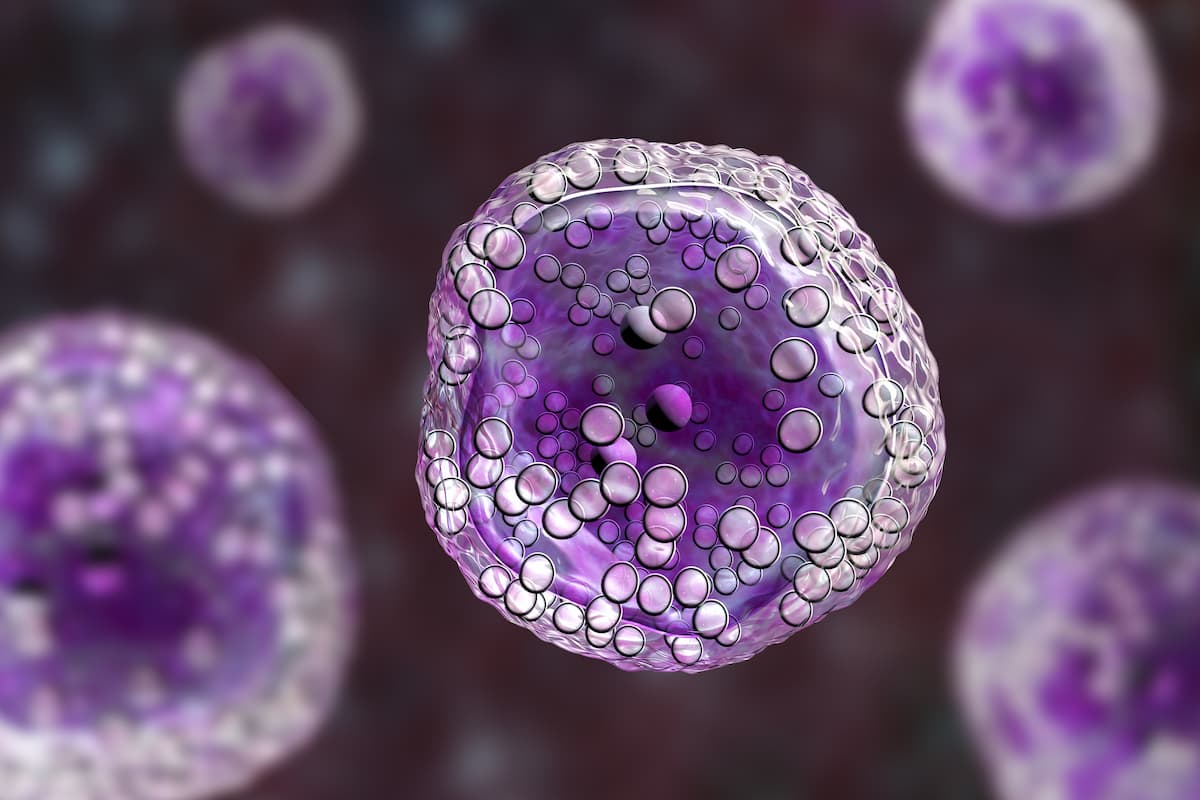A real-world analysis of teclistamab, elranatamab, and talquetamab showed comparable outcomes in relapsed or refractory multiple myeloma.
Real-world results from a prospective comparison study shared at the 2025 American Society of Clinical Oncology (ASCO) Annual Meeting showed that anti-BCMA and anti-GPRC5D bispecific T-cell engagers (BiTEs) were comparable regarding efficacy and safety in patients with relapsed or refractory multiple myeloma who were naïve to CAR T-cell therapy.1
The analysis evaluated 2 anti-BCMA agents, teclistamab-cqyv (Tecvayli) and elranatamab-bcmm (Elrexfio), and 1 anti-GPRC5D agent, talquetamab-tgvs (Talvey).
The 2-year survival rate was 55% in patients who received anti-BCMA agents and 51% in patients who received anti-GPRC5D agents (P = .76); complete remission was observed in 37% and 35%, respectively (P = .59).
Additionally, 4% of those who received anti-BCMA agents received subsequent CAR T-cell therapy vs 15% of patients who received an anti-GPRC5D agent (P <.05).
“Our analysis of real-world patients with relapsed/refractory multiple myeloma showed similar efficacy and tolerability between anti-BCMA and GPRC5D BiTE therapies,” wrote lead study author Ali Khan, MD, a fellow in the Department of Medical Oncology at West Virginia University, and coauthors, in the presentation.1 “However, the talquetamab group had a high rate of cytokine release syndrome [CRS], consistent with the high incidence observed in the phase 2 MonumenTAL-1 trial [NCT03399799, NCT04634552]. The extent of comorbidities, safety profile of individual agents, and plan for subsequent CAR-T cell therapy can guide the choice between available BiTE therapies.”
The study included a total of 266 patients who received teclistamab or elranatamab and 266 patients who received talquetamab using the TriNetX electronic health record database. Eligible patients had relapsed or refractory multiple myeloma without receipt of prior CAR T-cell therapy. Matching was conducted 1:1 via propensity score matching on 25 baseline characteristics until each arm had 266 patients. Analysis occurred 2 years after BiTE initiation.
The mean age of patients was 67.2 years in the anti-BCMA group and 67.4 years in the anti-GPRC5D group (P = .82).
The investigators noted that this study was needed due to the lack of head-to-head data necessary to make an optimal choice between anti-BCMA vs anti-GPRC5D BiTE therapies in this patient population.
The trial’s efficacy end points were overall survival and the complete remission rate. The safety end points were CRS, immune effector cell-associated neurotoxicity syndrome, infection rates, hypogammaglobulinemia, and intravenous immunoglobulin use.
The mean duration of treatment was, with the anti-BCMA agents, 246 days with teclistamab and 163 days with elranatamab; with the anti-GPRC5D agent, talquetamab, the median duration was 182 days.
Regarding safety, CRS was observed in 35% of patients who received anti-BCMA agents and 48% who received anti-GPRC5D agents (P = .002); the infection rate was 46% and 44%, respectively (P = .66). Intravenous immunoglobulin was used in 52% and 44% (P = .176).
The authors also noted several avenues for future directions of research. For sequencing, they mentioned optimizing the order of giving BCMA vs GPRC5D agents, leukapheresis yield, and CAR-T efficacy after each BiTE class. Additionally, they discussed testing the efficacy of BiTEs plus immunomodulatory drugs or immune checkpoint inhibitors. For biomarkers, they spoke on correlating antigen or T-cell profiles with response. Exploring equity by analyzing outcomes across age, race, and comorbidities was also of note.
They concluded by highlighting the need for more registries for long-term outcomes, quality of life, and cost-effectiveness.
In February 2022, the FDA approved teclistamab in relapsed or refractory multiple myeloma; in August 2023, the FDA approved talquetamab in the same indication; and 4 days later, also in August 2023, the FDA approved elranatamab in the same indication.2-4
References
- Khan A, Upadhyay L, Fatima Z, Safi D, Din Safi SU, et al. Real-world comparison of anti-BCMA vs anti-GPRC5D BiTE therapy in relapsed/refractory multiple myeloma without prior CAR-T cell exposure. J Clin Oncol. 2025;43(suppl 16):7542. doi:10.1200/JCO.2025.43.16_suppl.7542
- FDA approved teclistamab-cqvy for relapsed or refractory multiple myeloma. News Release. FDA. October 25, 2022. Accessed July 10, 2025. https://bit.ly/3Fgsi4s
- U.S. FDA approved TALVEY (talquetamab-tgvs), a first-in-class bispecific therapy for the treatment of patients with heavily pretreated multiple myeloma. News release. The Janssen Pharmaceuticals. August 10, 2023. Accessed July 10, 2025. https://prn.to/3KwnjyD
- Pfizer’s Elrexfio receives U.S. FDA accelerated approval for relapsed or refractory multiple myeloma. News release. Pfizer. August 14, 2023. Accessed July 10, 2025. https://bit.ly/3DTCRIY
